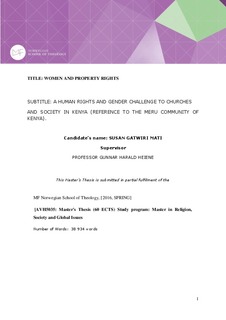Women and property rights : a human rights and gender challenge to churches and society in Kenya (reference to the Meru community of Kenya)
Abstract
In many developing countries like Kenya, issues of gender discrimination are evident in form of unequal inheritance and property rights. While there seems to be numerous campaigns for the advocacy of gender equality and human rights in all aspects, the practicability is something yet to be visualized. In Kenya for instance, customary law is quite dominant hence sabotaging any attempt to promote gender equality. In this paper, it has been noted that due to the impact customary law has especially on property rights, many have the feeling that security is more important than claiming for gender equality. Needless to say, this of course goes hand in hand with the primitive or traditional beliefs and practices that are still adored with high esteem.
The question of women rights to property inheritance in Kenya is therefore not without suspicions and mixed feelings. Besides other aspects like poverty and illiteracy among many women, there is the challenge of some traditional beliefs and practices that can be harmful to their lives. Instead of empowering women with the rights to inherit family properties, especially after the death of their spouses, many have the traditional primitive view that a woman needs to be inherited together with other properties of the deceased; after all she too is part of the properties the deceased owned. A lot therefore needs to be done in order to improve the current situation of women’s rights to inherit properties in Kenya.
Key words: Gender discrimination, customary law, Traditional beliefs and practices, poverty, and illiteracy.
